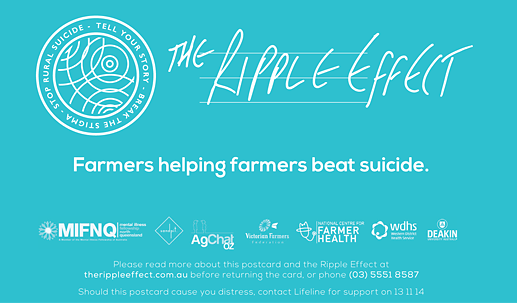
Ripple Effect Postcards to give insight into rural suicide
Tuesday 24 November, 2015
The Ripple Effect, a collaborative digital project spearheaded by farmers, health professionals and advocacy groups is inviting farmers to share their personal stories of suicide through a unique postcard initiative.
Farmers are being invited to provide input about their personal experiences of suicide in the Ripple Effect—a project where farmers are helping farmers beat rural suicide.
Victorian Farmer Nick Shady knows all too well the need for a new approach to dealing with the Ripple Effect of mental illness in rural communities.
“I know there’s a lot of talk about how rural men don’t open up and can’t open up and don’t see a forum where they can. That’s the hard part; how do we reach people who feel like that, before it’s too late,” Nick said.
Nick is now a member of the Ripple Effect Steering Group, a project he feels passionate about.
“We believe that by involving farming communities we can help turn the negative ripple of suicide into a positive ripple of support. To get this ripple started, we are calling on farmers to tell their story as a way to help others in similar circumstances.”
Katrina Myers, from Barham in New South Wales shares this sentiment.
“I’ve seen so many examples of where people who have personal lived experiences can make a really big difference and so I feel like there is that opportunity to do that.
“We are asking people from the rural farming community to share one thing about their experience of suicide that might be helpful to other people in the same boat. All they need to do is fill in and return a Ripple Effect postcard.
What would you want to tell someone who might be going through a tough time? What advice would you give them? It’s about helping each other turn the tide and learning from other people in the farming community.
The postcards are anonymous and postage paid. It’s a simple process, but one that can potentially make a real difference to someone’s life.
The messages from the postcards will be collected and shared as part of the Ripple Effect website.
People will be able to share their stories of what has helped them, learn from others and take action to make positive changes to their own health and wellbeing.
Alison Fairleigh from the Mental Illness Fellowship of North Queensland—a Ripple Effect partner organisation—explained one of the ideas behind the postcards.
“We understand that rural communities experience severe disadvantage when it comes to internet speed and connectivity, so we want to provide an opportunity for people to contribute to a positive ripple of support both on and offline.”
“The Ripple Effect is about farmers helping farmers. We know through our own experience, that no one tells a story about life on the land, its ups and its downs better than farmers themselves. We also know that people in farming communities are renowned for helping each other—that’s what keeps small communities alive. The Ripple Effect postcards combine the strength of storytelling with rural people’s natural enthusiasm for supporting each other,” Ms Fairleigh said.
The Ripple Effect is a partnership between, National Centre for Farmer Health, Deakin University, Sandpit, Victorian Farmers Federation, AgChatOz, Mental Health Fellowship North Queensland and Western District Health Service.
The Ripple Effect is funded by beyondblue through donations from the Movember foundation.
To request a postcard, find out more information about the Ripple Effect postcards or add your name to our contact list, please visit http://www.therippleeffect.com.au or phone the National Centre for Farmer Health on (03) 5551 8533.
If you are feeling distressed, we urge you to call Lifeline on 13 11 14 or beyondblue on 1300 22 4636 or Suicide Call Back Service on 1300 659 467 for counselling support.